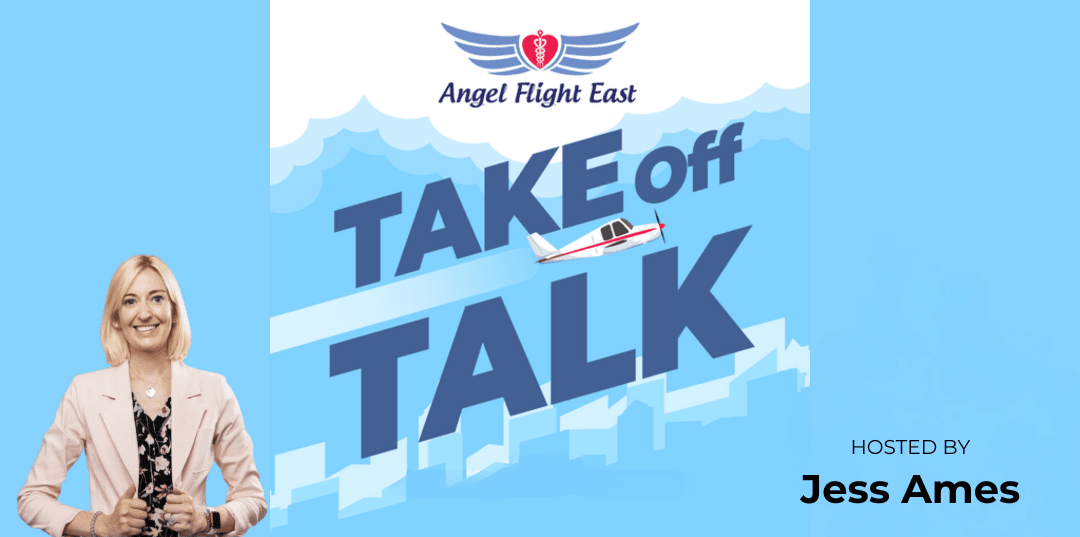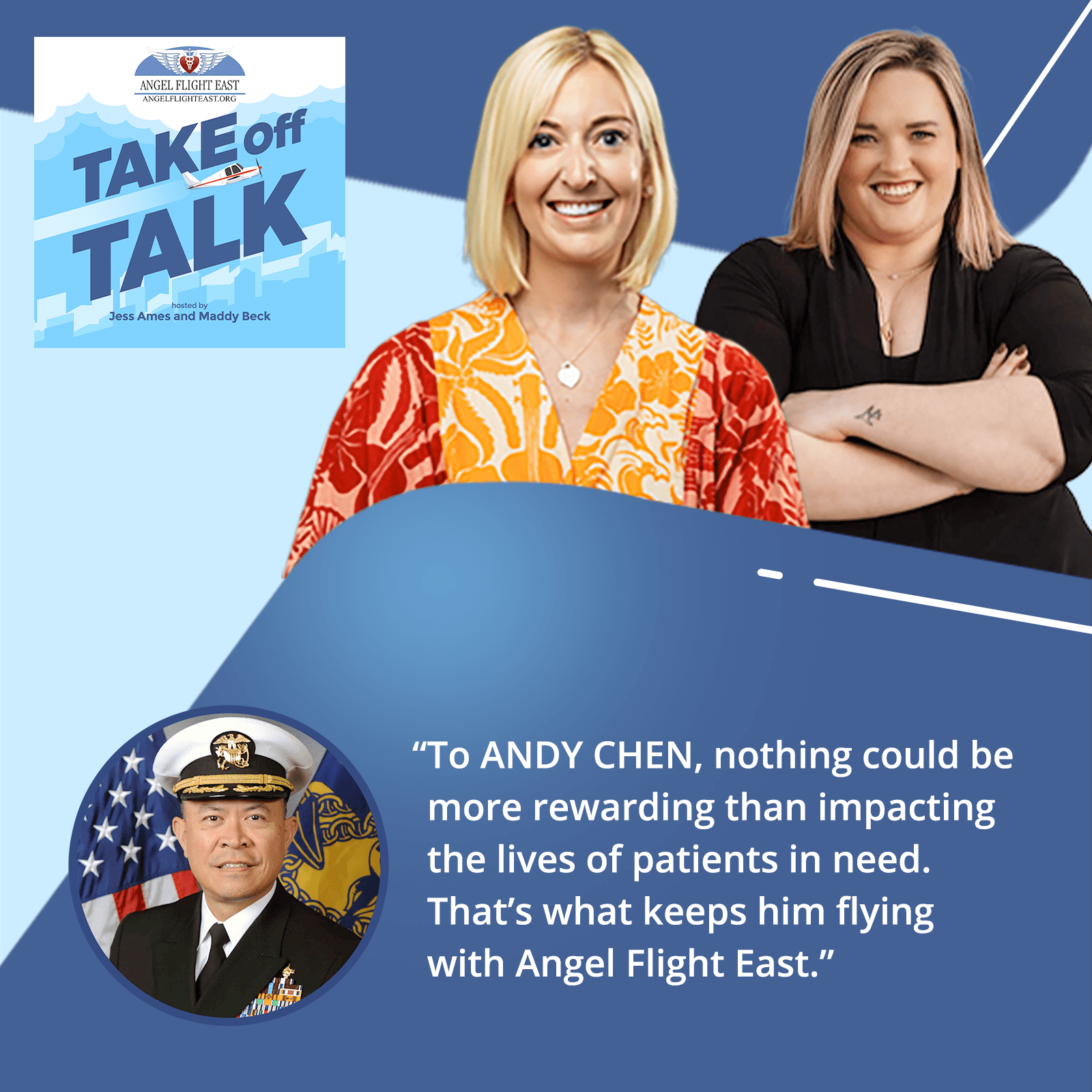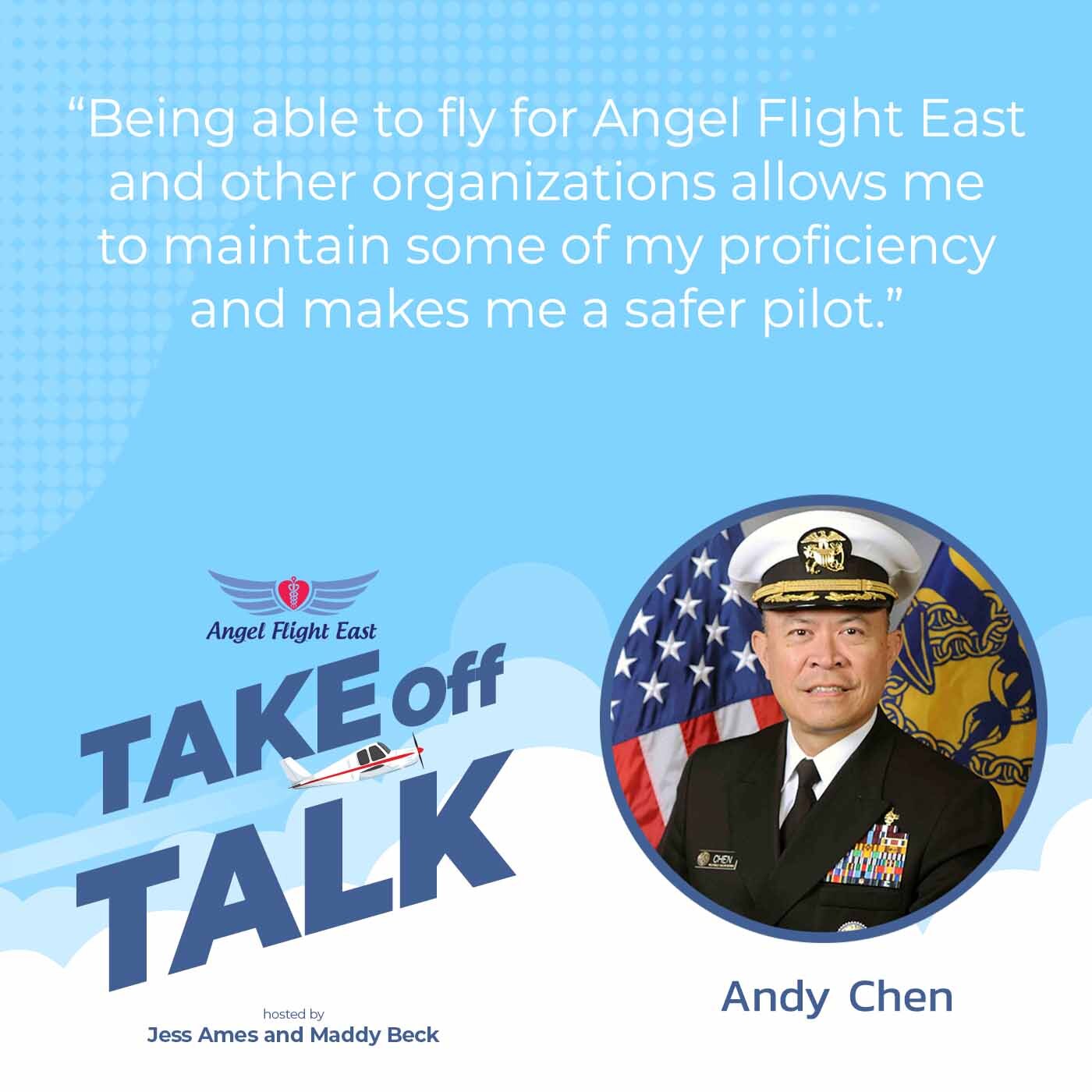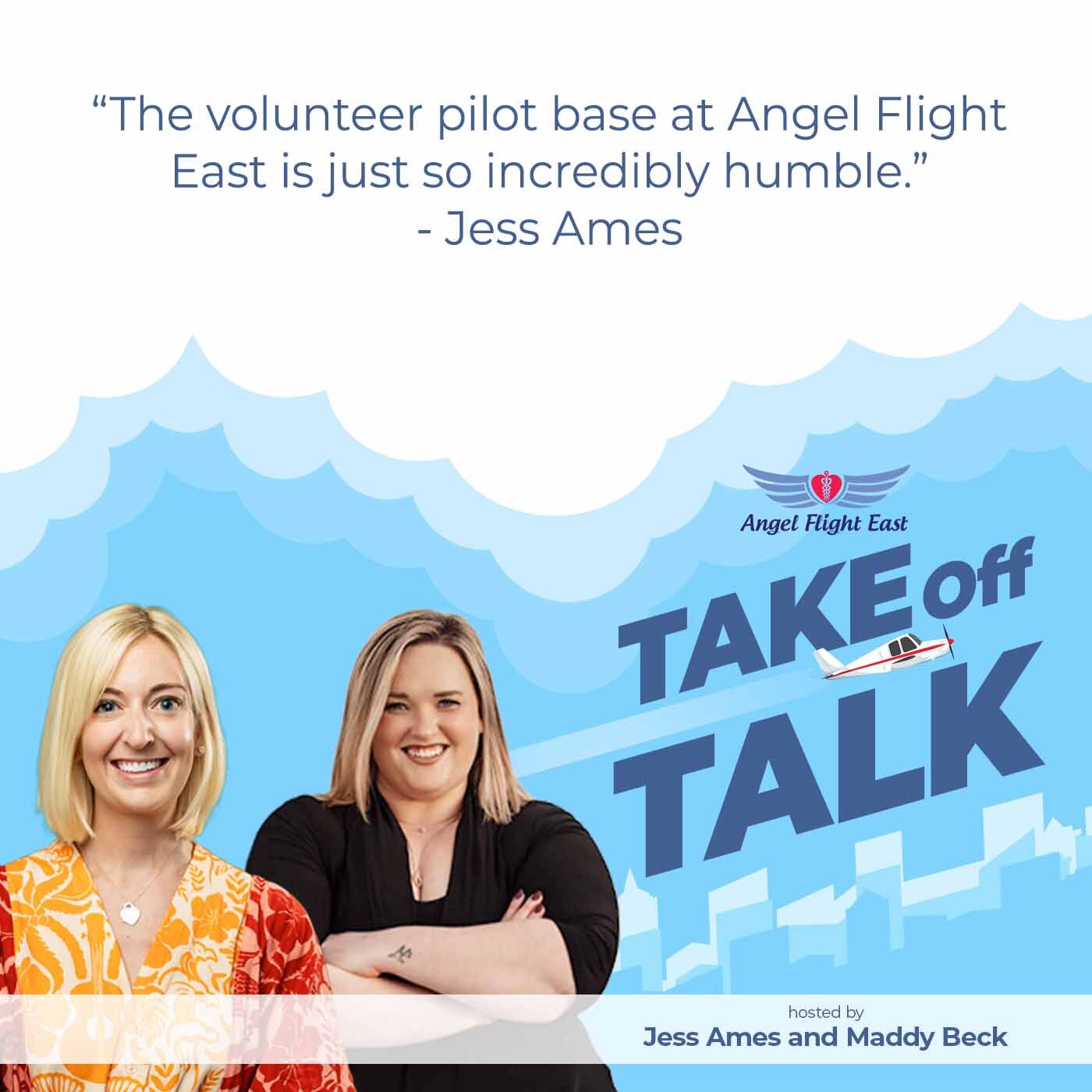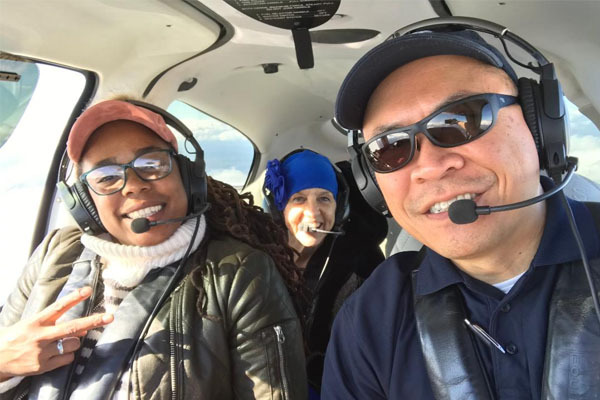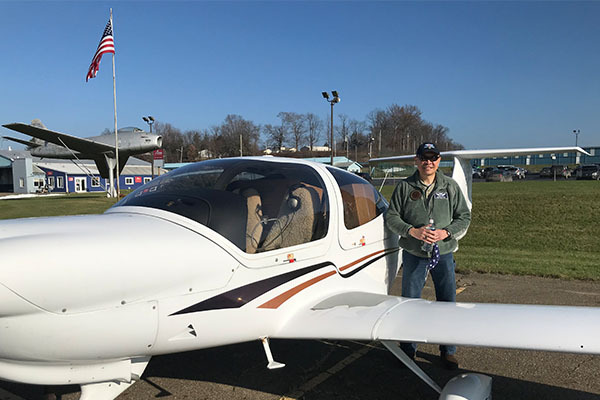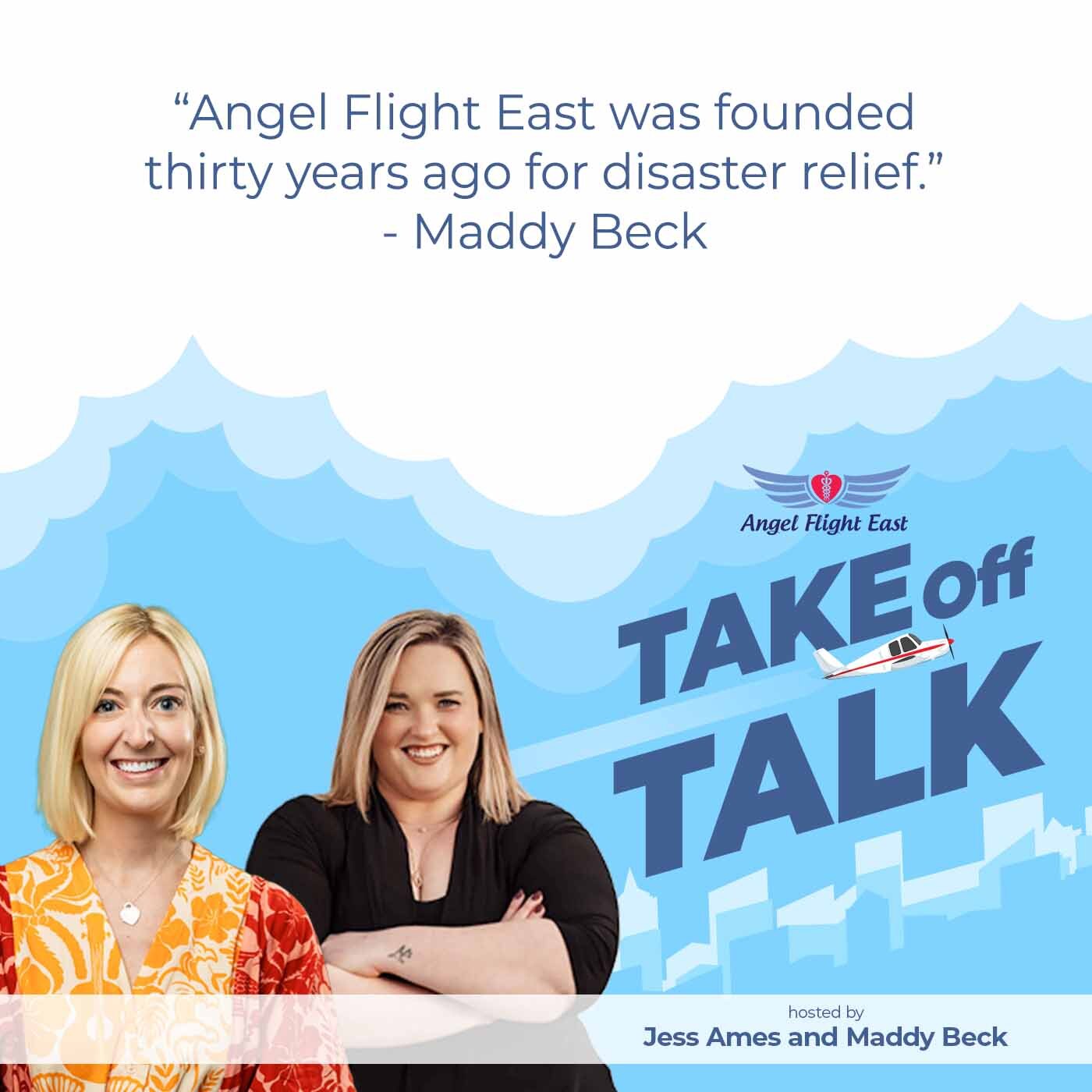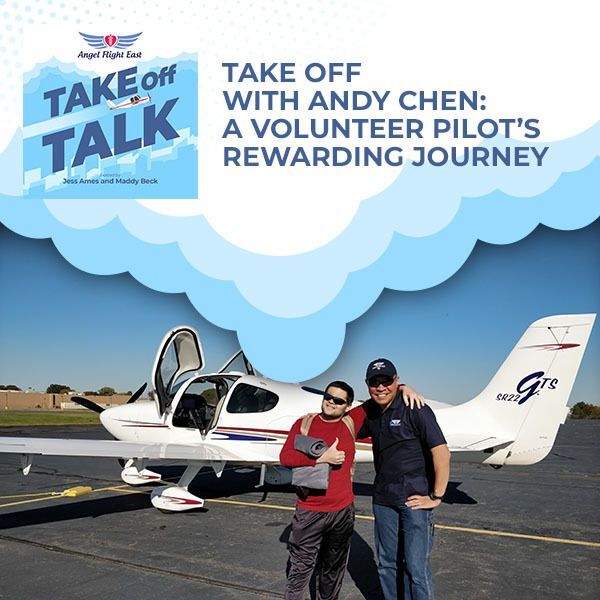
Nothing is more rewarding than being part of the passenger’s medical journey. Today, Andy Chen shares how he became a volunteer pilot and recounts his rewarding journey of transporting and transforming passengers throughout their medical journey. He shares the relationship maintained between pilots and passengers. Also, Andy reveals the Facebook group he joined and why “this IS an airport, please announce your departure: aeroplane ear posting” resonated with him. You may not want to miss this episode if you are interested in public benefit flying!
---
Watch the episode here
Listen to the podcast here
In this episode, we have volunteer pilot, Andy Chen, joining us.
Jess, Maddy, how are you doing?
Great. Thanks for joining us.
Thanks for having me.
Andy is based out of the Trenton Airport. How long have you been flying with Angel Flight?
I started in the spring of 2019. Full disclosure, and I guess we'll hear a little bit more about this later, but work and wife and stuff have gotten in the way. 2019 so far has been the only year I’ve flown Angel Flight passengers. I had a lot of fun in 2019. I'm looking forward to re-engaging and flying more folks as time goes on.
How did you hear about Angel Flight East?
I heard of Angel Flight in general long before I ever got my pilot certificate. I was probably a teenager or in my twenties or something like that. The concept of Angel Flight itself had been around for a little while, and I always thought how cool an organization that is. I heard about Angel Flight East, specifically when I was still a student pilot. I walked into my AME to get my Class 3 medical and get my student certificate. My AME had a little billboard or advertisement for Angel Flight East right there. I grabbed the pamphlet or whatever she had there and started looking through it. It was like, “Three hundred hours instrument rated. Got it.” I crossed 300 hours a year and a half after I got my instrument ticket in the spring of 2019. That's when I reached out to you all to start flying for you.
I also want to give you the benefit of the doubt that there was an entire world pandemic between that last flight and now.
Yes, there was. Unfortunately, my day job is involved with that.
What is your day job?
I am an officer in the US Public Health Service Commission course. I am an active duty service member. If you hadn't heard about us before the pandemic, you probably did during the pandemic. If you never heard of us even during the pandemic, you still have heard of us. If you look on the side of a cigarette box or on a bottle of alcohol that says, “Government warning. The Surgeon General says this is bad for you,” that's my Surgeon General.
The Surgeon General in the United States is a three-star Admiral in the US Public Health Service. The agency that I work for does all of the public health and medical services stuff during emergencies and disasters in this country. Even though I don't work for FEMA, the easiest way to think about it is we're the public health and medical arm of FEMA during emergencies and disasters. If you want to learn more about us, I’ll give you two websites real quick. The first is USPHS.gov, so US Public Health Service. PBS dropped the documentary about us. If you go to InvisibleCorps.com, you'll see information trailers and there's a link where you can watch the whole documentary, which is about an hour long. It talks about all the things that we do.
I believe you also flew PPE for us a couple of times, didn't you?
Yes, I did. I did do two PPE flights. In one of them, I was able to bring my father-in-law along on that flight. Not only that but on the same flight, I was able to use the COMPASSION call sign for the first and only time I’ve been able to use it. That was a neat flight.
I feel like we've been talking a lot about the PPE flights in these interviews because the pilots that we're talking to have completed them. On the other hand, Maddy and I never want to think about being in the supply chain business again.
Funny enough, because of my day job, I'm still monitoring some supply chain issues that are still going on out there.
That's interesting. That's awful, too, especially because all of our supplies went to the rural hospitals. Without us or the volunteer pilots, they would've never been able to get the face shields or the hand sanitizer. It was such a crazy time.
It's interesting you bring that up. Before we started this interview, I was on a call hosted by FEMA and they were showcasing DART, Disaster Airlift Response Team, and EVAC, Emergency Volunteer Air Corps. The presenter was talking exactly about that in addition to all the PPE, all the medical supplies that were being flown, particularly in the Pacific Northwest, and how they could keep a lot of the facilities going because of those flights.
"FEMA is showcasing Disaster Airlift Response Team and Emergency Volunteer Air Corps."
When people think of those organizations, the EVACs and the DARTs, they're thinking of Haiti when it was hit by a hurricane and there is nothing to receive. They think about, “Here comes the helicopter with cases of water,” and things like that. When it comes to these small community health centers where that is their source of primary care, it's not even on their radar. They're like, “They don't have the Jefferson, the Penns, and all of that right around the corner down the street.”
I was in Puerto Rico for Hurricane Maria, supplying the mountainous region in the center of the island there with their supplies, medical care, personnel, and all that stuff. That was a huge challenge, even for things something relatively simple as Hurricane Maria.
We've heard about the different types of volunteer piloting that are available. What is your why personally?
I don't want to use the word clientele, but maybe that is the right word. When you think about the clientele we serve with Angel Flight East, that's a natural extension of what I do. I’ve been in healthcare my entire career. For me to then be able to blend aviation with healthcare, I don't have the time to go get my search to become a Medevac pilot or fly EMS helicopters or anything like that now. Especially at this point in my career, I don't have that ability, but that's part of my core. Being able to then volunteer, take the skill that less than 1% of the population has in this country to be a pilot, and to be able to apply that skill and be able to serve in the healthcare arena, that's my why.
Also, the whole volunteerism thing. There's a reason I'm a service member. There's a reason I was a volunteer EMT and ski patroller back in the day when I was still in the civilian world before I joined the service. For me, that's a natural extension. I get to use a skillset that otherwise might get a little rusty, to be frank. Being able to fly for Angel Flight East and some of the other organizations allows me to maintain some of my proficiency as well and makes me a safer pilot.
It's much better than the $100 hamburger.
There's nothing wrong with the $100 hamburger because, at some point, we all have to eat. Have fun doing that too. It goes back to we're able to take this very unique skillset that we have that not very many people have in this country and apply it towards good.
What has been one of your favorite flights you've done with Angel Flight?
It goes back to that PPE flight I did with my father-in-law for coming out to Wings Field and running into both of you, as I recall. To be able to fly with my father-in-law, it was something special. It is to be able to share that experience with him. Use the COMPASSION call sign because I’ve had it now ever since we transitioned to the COMPASSION call sign for various reasons. Mainly because my primary airplane, it’s difficult to change the call sign, the avionics and the transponders. I'm not able to use it there. The one time I was able to use it, that was fun and be able to hear my call sign over the radio. Combined with all of that was a very fun and neat experience.
Is your father-in-law an aviator or was he totally out of his element with you?
He was totally out of his element, but he was having a good time. I’ve had the good fortune to fly my father-in-law and my mother-in-law on the New York City Hudson River Quarter flight. That was the third time my father-in-law had flown with me. He was one of my first human passengers after I got my private certificate. I say that specifically for a reason. Thanksgiving 2014, I had earned my private certificate a week or two weeks before. I took one of my friends and my father-in-law flying over that particular timeframe.
You had also flown the gentleman who had eyesight problems, I believe. I'm blanking on what his name is.
Was this the gentleman out in West Virginia?
I think so. I always use the picture of you guys holding the thumbs up. I forget what his name is.
Yes. His name was LP. His name was Lloyd, a young man. I remember this very vividly. I flew him in October 2019. Fun story. He was flown up to me at Patrick Henry Field in Newport, Williamsburg Airport. I happened to be there on vacation with my in-laws and my brother-in-law. Ironically enough, my wife couldn't make it for vacation, but I was there and I was waiting for him. The VC-25 cargo airplane, better known as Air Force One when the president is on board, was in the pattern there doing touch and gos. I'm waiting for LP to show up with his mom.
I'm standing on the wing route looking up at the Boeing 747, technically VC-25 doing touch and gos. The other pilot brought him in and we were able to transfer him. I was able to fly him up to Linden, New Jersey, as I recall, so that he could make his medical appointments. He is a fantastic individual. As I recall, he had gone blind in one eye and had very limited vision in his other eye due to cancer. We're getting into some of the medical conditions. Unfortunately, he did pass away the following spring. I still remember the conversation and the flight with him because it was about an hour and a half flight, and it literally went like that because we were having a fantastic conversation.
His dad was a Navy veteran. We were talking about different things, like the F-14 Tomcat. You can see the Super Hornet hovering in the background behind me. He seemed to know everything about the F-14 Tomcat. I was a little bit of a student of the airplane myself because I grew up in the era of the Tomcat. I wanted to fly Tomcats when I was coming out of college. I didn't have the eyesight. To make a long story short, I never went into the naval flight officer pipeline. I didn't get the opportunity I was hoping otherwise to get a backseat slot in the Tomcat. He knew about the engines. I thought I was the only nerd that knew about the TF-30 engines and the F-14 Tomcat.
I thought I was the only non-Navy guy that knew about it. He knew about it, knew about their problems and everything and how they're prone to compressor stalls and things like that. The energy and joy that he brought to life, despite the fact that maybe in the back of his mind, he might have known he might have had a terminal illness, but you would never have known that by talking with him. I’ve only flown four passengers, so I still remember the other three as well. LP stood out in my mind for the joie de vivre that he brought, despite the fact that he was battling cancer and everything. What an honor to be able to spend an hour and a half with him.
I was able to text with his mom a little bit afterward. I think he used that picture in the year-end roundup for 2019 that got released the following spring. I saw that and I reached out to his mom and said, “We made the Angel Flight East video.” She said, “That's wonderful. Unfortunately, he did pass away two months ago.” That was heartbreaking to hear from his mom. At the same time, what an honor it was to be able to fly him and be able to provide that service to him.
I love to hear about the relationship that is maintained even after that flight. You're in a tight space with a stranger for an hour and a half. Even from there, you are still connected.
I follow you all on social media, and it warms my heart so much when I see you posting pictures, particularly the kids that have grown up and the repeat pilot. It's not like the kids rotate to different pilots. It's the same pilot who sees the mission pop up and goes, “I want that kid again.”
Those kids have their own fleet of airplanes and pilots. They're very lucky. Those are the stories we love to tell about, the bond between the patients and the pilots despite what they're going through. All of the patients we fly with are so positive and have this incredible outlook on life. We look back and we're like, “Our days are no way, in comparison, as hard as these people that are sometimes battling a life-threatening illness.”
Certainly, we're providing a service for them. Let's not take that anything away from the pilots that volunteer their time, their aircraft, and frankly, their financial resources to be able to do this. We don't get reimbursed for any of this. We do this out of the goodness of our own hearts. I say that humbly and not to toot my own horn, but to be able to provide that service so it takes that financial burden off the families so that they can still make their medical appointments.
They're not paying for the commercial flights and, at the same time, they're not having to sit in a car for 6 to 10 hours one way at a time. That's so rewarding for us as pilots, but also, you can see the gratitude that the patients and their family members have and they're able to then parlay that into such a positive outlook for themselves as well because they know that's one less thing they have to worry about.
The volunteer pilot base at Angel Flight East is so incredibly humble. I always feel like when Maddie and I talk about them, they shrink down because I'm like, “Somebody has to brag about what the men and women are doing,” because it's an incredible service. I feel like they will never get enough credit for the sacrifices they make with their time, their finances, and everything to help people get to treatment far from home.
There's that running joke, “How do you know someone's a pilot? They'll tell you.” At the same time, you're right. That's what attracts a certain personality to Angel Flight East. We're the ones that are there to help. We do it because we love flying and we love to be able to provide this service and all that. We don't mind being in the background of all of that and let the patients get the spotlight because, ultimately, they're the ones that are sick and they're the ones that need the help. We're happy to do that and then be able to let them take that spotlight.
"Volunteer pilots are the ones that are there to help. They enjoy it and do it because they love flying and provide this service."
Speaking of attracting to things, what was your attraction, other than the nerdy love of the engines that attracted you to aviation? What made you become a pilot?
I grew up in the generation of the original Top Gun movie, I cannot lie. I'm a product of that original Top Gun movie from 1986. As a side note, when my wife and I finally went to go see this movie and the opening credit started to roll, the tears streamed down my face because it brought me back.
We need to bring your wife onto this now.
We need to hear her side of things.
She enjoys flying with me, but she's not in aviation either. I thought that it was so cool to see that and to be in that environment. Despite everything that the movie showed, it is the camaraderie and the teamwork that goes involved with that the military aviation side. I'm very fortunate. Even in my day job now, occasionally, I am able to jump on an Air Force airplane and go flying. I was on a flight with the Air Force, but that part of it attracted me to flying. I already knew that I was going to be able to be a pilot. I started wearing glasses the summer between fifth and sixth grade.
I knew being a fighter pilot wasn't in the cards, but trying to get that seat in the backseat of the F-14 was something I was trying for. To make a long story short, even though I tried, I never had the opportunity to go on active duty with the Navy and even try for a slot. Although I did get one orientation flight down at Pensacola. To be more precise, NAS, Naval Air Station, Whiting Field. I did get a ride in the backseat of a T-34. I’ve got a picture or two on social media where I'm wearing the flight helmet, the flight suit, and all that stuff while I was in college but never got the opportunity to fly for the military. I didn't think about general aviation a whole lot until one of my wife's friends took me flying.
I was stationed in Washington, DC. I'd already started with the public health service. He flew down to Gaithersburg, Gulf Alpha India, to pick me up and bring me up to Penn Valley Airport, Selinsgrove, Pennsylvania, Sierra Echo Golf. He brought me in there on a flight because I was flying up. My wife and I were doing some wedding prep. It was back when we were engaged at the time. That was my first exposure.
Another time, he flew us out to the Air Force Museum at Wright-Patterson Air Force Base out there in Dayton, Ohio. That's when I learned about general aviation. I realized I had to get my pilot certificate, where my wife gets involved. She said, “You're free to get your pilot's license, but you have to pay off grad school first.” She's the financial steward in our family and God bless her for that. I paid off my grad school loans in January of 2014, and that spring is when I started working on my pilot cert.
Shout out to my wife. I say this to give her some credit, not for managing us and letting me do all of this stuff. In her career, she was in Big Pharma, and as a side note, I won't say which company she worked for or which drug she worked on specifically, but she worked for one of the large pharma companies where she was the global brand leader in her last job. She has since left and is doing something completely different now, but she was the global brand leader for her company's COVID oral antiviral medication. She was busy in the last few years that she was at her company. I'm so proud of her for all the work that she did to get her company's drug out there into the market.
Mrs. Chen, we're rooting for you.
Her name's also Jessica.
All Jessica's are great.
For the record, I'm going to ask you a question. How's married life? I know you're relatively new.
I know. I wish my husband would talk about me like that, but I don't know if he would be that nice to me on the show. It's great. It's the same, except you have a house and more bills to pay. Other than that, I'm working on changing my name officially, but it is not a fun time to spend at this Social Security office and the DMV. That is in the process.
I know we're taking this conversation off-topic, but my wife did not change her name. She said, “I'm sorry. I'm too lazy and it's too much trouble.” She has no problem being called Mrs. Chen and I have no problem being called by her last name. I'm used to it as the only child of a single mother who used her maiden name professionally. I got called by my mom's maiden name a lot. I was used to it. For me personally, I was like, “Whatever.”
Tell that to my mom, who asks all the time if I changed my name yet. I was like, “I'm working on it.” It's a long process for us.
Say yes and be called Mrs. Whatever.
Barry.
Jessica Barry. It's all good.
Andy, if there was anything you could say about being a volunteer pilot, what would it be?
It's so rewarding. It's one of those things where you meet some fantastic people, even though they're going through some tough times in their lives, particularly cancer patients. It goes back to the whole concept of giving back. As pilots, we're part of that 1% or less that have that unique skillset. Let's be honest. If we're able to get our pilot certificate, most of us have some financial resources that the vast majority of the population doesn't. It's incumbent upon us to then be able to give back to the community. This is a fantastic way of doing it, where you're taking that's a unique skillset that many of us do not have and we're able to apply it and apply it for a good cause.
What is something that you would say to non-aviation-based readers?
Recognize that we do it for a love of aviation and a love for our fellow human beings and mankind. Our skills do degrade, so this is a perfect opportunity as well for us to keep our skills up and maintain our proficiency as well. Ask us questions. If you find yourself on a general aviation flight because a friend happens to be a pilot, ask us questions. We love to talk about flying. We love to talk about how things work in the airplane, how the systems work, how the avionics work, and what it is it's like to talk to air traffic control. This is going to be embarrassing to admit, so I’ll get skewered for this on social media.
"Volunteer pilots do it for a love of aviation and for a love for our fellow human beings."
I belong to a group on Facebook that's associated with cats, also known as felines, and aviation. One of the things that this particular group allows is when a person's cat passes away, to announce it and be able to express their sorrow and everything. I think I'm the only person in this group that does this, but there is the Egyptian Goddess Bastet. She's the Egyptian goddess that watches over cats. In this particular group, we call it Bast Earport because we talk about a cat's ears flattening out because they become an airplane. We call it earport.
I give a full route RFI clearance to Bast Earport for those cats that pass away. That's how I'm educating a little bit of the non-aviation community. This is what a full RFI route clearance looks like. Yes, I'm doing it in the context of fun and that kind of thing, but now they have an idea of the whole craft process and what it looks like in a complete non-aviation setting. We love to be able to answer those kinds of questions as well.
What is this group called? Can anybody join it?
The name of the group is This IS an Airport, Please Announce Your Departure: Aeroplane Ear Posting. If you want to do a shorter version, search on Facebook for the earport and it's all about cats and their ears flattened out.
That is the best thing I’ve heard all day.
For any of you that are reading, imagine a cat's ears flattening out. That's the whole thing about this whole airplane ear.
Whoever created that group is a genius.
My wife and I have three cats. She's a veterinarian by training, and that's what she's doing now. She's back in small animal veterinary practice. Instead of having drugs in the house, now we have cats.
Do you fly for Pilots N Paws?
I do. I occasionally will pick up a flight on Pilots N Paws as well. I work directly with a couple of dog rescues, so they will simply reach out to me directly. One of them is in Egg Harbor Township, New Jersey. She tends to pull dogs from down South like the Carolinas or Georgia. I will go on Pilots N Paws to try and coordinate that first leg to shorten my flying time. Now, I'm flying a Diamond DA40. As fantastic of an airplane as it is, it doesn't quite have the range and the speed that the Cirrus SR22 I had been flying previously had. In the SR22, I did one flight where I went past Macon, Georgia, nonstop on one leg and then picked up some dogs and flew them back.
I can't quite do that in the DA40. I’ll sometimes work and coordinate with a fellow pilot to do that first leg and then I’ll meet them as well. There's a rescue in Egg Harbor Township that will often call me up directly. There's another rescue that specializes in pounds, so breeds like beagles and those kinds of things. She's in the Chesapeake, Virginia area. Occasionally, I will fly her as well.
Now you're talking my language. I have two Basset Hounds.
I flew beagles.
How do you not keep them? I could never give them back.
I need to tally up how many dogs I’ve flown. I'm somewhere in the 25 dogs range and 2 cats, one of which was my own. Of all the dogs that I’ve flown, I still remember this one beagle. Her name is Posey. Ryan, the pilot, if you're out there, I hope Posey’s doing well. She was in a Pilots N Paws flight because I was flying a flight for Sharon, the rescuer in Egg Harbor Township. It so happened there was a Pilots N Paws flight that was flying in the same area or whatever. We were able to coordinate. I was able to bring both. Posey was like this dog. She fell asleep in the front seat next to me in the co-pilot seat.
She wouldn't stay in the back. I tried to put her in the back. She refused to stay back there. I put her in the co-pilot seat and wrapped her up in a blanket and she slept the entire way. Every fifteen minutes or so, she would look back up and make sure I was still there and then she'd go back to sleep. When we landed at the first airport, where I was meeting the other pilot and then transferring the other dogs to the rescuer, I was carrying her in my arms as I walked around the airport, looking for the rescuer. The other pilot, Ryan, met me at the airport, transported her up North to the rescue that was taking her in, and then wound up adopting her. Ryan still has her and never changed her name. Her name's still Posey. Her name was Posey when I got her and he kept the name.
Thank you so much, Andy, for taking the time to meet with us. This has been so much fun hearing about your experience as a pilot and also as a pilot for public benefit flying.
Thanks so much for having me. I had a lot of fun doing this and good luck with the rest of them. I hope your other pilots also have a great time. I take that back. I'm sure they will because you two are fantastic to work with. We love working with all of you. I can safely speak for all the Angel Flight East pilots when we say we enjoy working with all of you. Thank you also for all the behind-the-scenes coordination that you all are doing.
We couldn't do it without you guys, so thank you.
Before we wrap up, I'm going to put out a plug. I'm a service member, so I'm coming up soon on my years of service and thinking about punching out. It's a plug for you all at Angel Flight East and the pilots who may be out there reading this. If there's any interest in Angel Flight East getting into the disaster response world, let's have a conversation because I might be able to help facilitate some of that stuff when I retire and have a little bit more time to help with some of the stuff like that.
That would be awesome. We'll definitely call you for that one.
I'm already trying to reach out to the guy who gave the presentation about EVAC and DART, so maybe we might be interested, especially if there's enough interest from the pilots out there who want to help. Maybe we can set up a little subgroup within Angel Flight East that could then take that on as a special project or something like that.
I don't know if you know this, but 1992 was the founding of Angel Flight East. We were founded for disaster relief. We originally did flights down to Florida for Hurricane Andrew. We were flying medical supplies and medical professionals down there.
We'd be getting right back to our roots if we start going down that road. I’d be happy to take that on because, as a Fed working within that FEMA structure, I already know how that part of it works. It's simple. It’s a matter of plugging in and making sure we're talking to the right people and coordinating the right way.
From the EVAC DART guy that I heard the presentation from, it sounds like there needs to be a little bit of infrastructure that we need to set up ahead of time, particularly within organizations and organizational structure. If that's something that AFE is interested in doing and there are enough pilots that would be interested in doing that, as a volunteer, I'm happy to help work that in the background once I retire from active duty. I’ve got about a few years to go before I'm ready to punch out.
Thank you so much for your service and all you do for Angel Flight.
I’m happy to do it. Thanks for having us aboard and we're glad to be here, as they say in the Blue Angels.
Thanks, Andy. We'll see you soon.
Thanks, guys.
Important Links
- USPHS.gov
- InvisibleCorps.com
- This IS an Airport, Please Announce Your Departure: Aeroplane Ear Posting – Facebook
- https://AngelFlightEast.org

